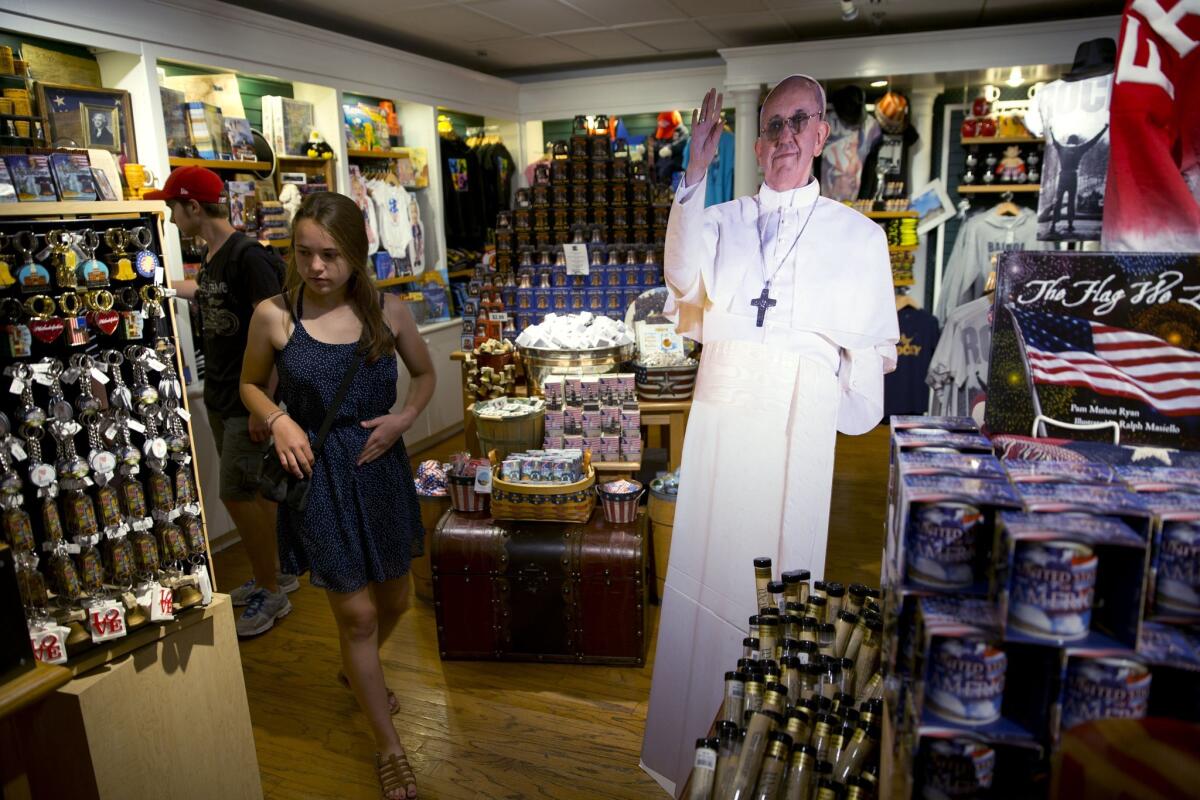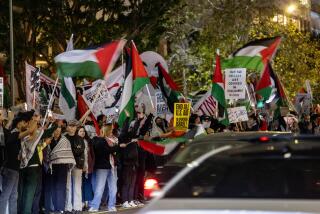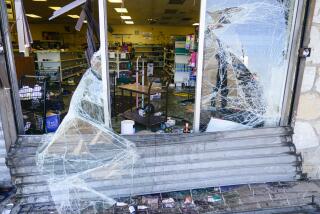Philadelphia plans intense security for Pope Francis’ visit -- some say too intense

A cutout of Pope Francis is one of hundreds of papal souvenirs being offered in Philadelphia, weeks ahead his scheduled visit.
- Share via
Reporting from Philadelphia — There are papal pendants. There are life-size papal cardboard cutouts. There are papal mugs, ideal for drinking your specially brewed papal beer.
There is even a papal toaster, which will sear the image of the smiling, waving Pope Francis onto your sliced bread.
But heaven forbid you try to find a taxi when Francis visits Philadelphia, where the security ramifications of his arrival later this month are becoming clear.
Francis also will visit Washington, D.C., and New York City on his U.S. tour, which begins Sept. 22 and ends Sept. 27, but those cities are accustomed to playing host to high-profile visitors in need of extraordinary security. In fact, at the same time the pontiff is in New York, more than 160 world leaders and their delegations will be there for the annual United Nations General Assembly gathering.
New York’s police commissioner, William J. Bratton, joked to reporters at a recent news conference that he was “loading up on the Excedrin” in anticipation of the confluence of events.
One can only imagine the drugs officials in the City of Brotherly Love, the centerpiece of the papal tour, will need.
At a news conference in August, Philadelphia Mayor Michael Nutter outlined the security measures that will begin taking effect two days before the pope arrives. There will be security zones within security zones. There will be metal detectors through which pedestrians will have to pass. There will be miles of streets closed to vehicular traffic, including the vital Benjamin Franklin Parkway, which slices through the heart of Philadelphia, from City Hall to the art museum steps immortalized in the Oscar-winning movie “Rocky.”
Schools will be closed part of the week, as will most city offices. Businesses are being told to arrange deliveries well in advance. The bridge linking Philadelphia to Camden, N.J., will be open only to foot traffic. Fences will be erected starting Thursday night, Sept. 24, around the two main security cordons, essentially roping in people who live there and barring those who do not. At more than three square miles, the secure area will cover more space than Vatican City.
Things will begin returning to normal the following Monday, Sept. 28.
So extraordinary are the measures that some have speculated they will turn people off, leaving Philadelphia far short of the more than 1 million pilgrims expected to converge on the city to see Francis and attend the World Meeting of Families, an event held every three years and sponsored by the Holy See.
“What if Philly threw a pope party and nobody showed up?” read the headline last week in Metro, a local newspaper. It noted that there still were hotel rooms available and that thousands of special rail tickets set aside for trips into Philadelphia for papal events had not sold out as expected.
Nutter says it is better to be overprepared than underprepared for the first papal visit to Philadelphia since 1979.
“I get it. We get it,” Nutter, sounding mildly exasperated, said Aug. 5 as he gave the city a detailed look at the security measures. “Yes, our daily routines will be disrupted, sometimes in minor ways, sometimes in significant ways.”
Nutter emphasized that no matter what the headaches, the event would be “a whole lotta fun.”
It might have come across as more convincing if Nutter had smiled or if he had not been flanked by grim-faced men and women from the Secret Service, Department of Homeland Security and the city’s Office of Emergency Management.
All will play a role in providing security during the papal visit, which U.S. authorities have designated a special security event, the same label given to the Super Bowl or World Series. (Speaking of which, there is a papal baseball to commemorate Francis’ visit, created by Pennsylvania artist Emily Wolfson, who is selling a limited number of them.)
This means people have about as much chance of seeing the pontiff up close as they do of catching a foul ball at the World Series, especially if they hope to get into the grand Cathedral Basilica of Saints Peter and Paul, where Pope Francis will celebrate Mass on Sept. 26.
“Two thousand five hundred people, squeezed,” Bob Duncan, a volunteer guide in the church said when asked how many people could fit into the basilica, which is about midway between the Philadelphia Museum of Art and City Hall.
Duncan pointed out in the basilica the red-and-gold umbraculum, or umbrella, which will open to herald the pope’s arrival. The last time it opened was in 1979 to greet Pope John Paul II.
Duncan remembers the crowds that thronged Logan Square outside the basilica that day. He saw John Paul II, albeit a tiny version of the man, from a distance.
Duncan acknowledges that the upcoming visit has some people fretting about inconveniences. “But it is a great honor,” he said.
Nevertheless, he will not be around for this papal visit. Duncan is taking his family to North Carolina’s Outer Banks to escape the crowds.
That is not an option for everybody, and certainly not for businesses in the center city. With that in mind, the Philadelphia chapter of the International Special Events Society sponsored a meeting last week to advise business owners on how to manage.
Bob Mills, who helped organize the event, said the Special Events Society represents caterers, photographers, entertainers and other professionals involved in “wow” events. “And you can’t get anymore wow than the pope coming,” Mills said.
One challenge around an event like Francis’ arrival, Mills said, is convincing business owners that they should not jump like rats off a sinking ship to escape the logistical hurdles.
“It is a great opportunity for everyone to showcase Philadelphia,” he said, comparing the panic factor to when weather forecasters predict a blizzard and everybody rushes to the supermarket and buys food he or she doesn’t need.
Speakers at the society’s event had some basic advice for restaurants within the security zone: Simplify your menus and stock up on nonperishables like pasta and on items that can be frozen.
As for people who have planned events like weddings or bar mitzvahs that will be affected by the security zones, Mills said there was no need to cancel.
Just plan ahead and find vendors ready to take on the logistical challenges.
“Prepare is the message,” Mills said, noting that the visit was announced nine months ago.
One vendor who is prepared is Butch Henry, who sells bottled water at the foot of the art museum steps. Because of security measures, he won’t be able to roll his large ice chest into its usual spot on the days the pope visits, so instead he will set up across the wide avenue, just outside the security zone. When he runs low on water, his son will shuttle more to him in a wagon.
Henry, who usually makes about $150 a day, expects to earn far more when pilgrims crowd the area hoping for a glimpse of Francis.
Henry is not worried about missing the pope.
“I will see him,” he said.
And if the pope needs water?
“I’d give it to him for free,” Henry said.
Twitter: @tinasusman
More to Read
Sign up for Essential California
The most important California stories and recommendations in your inbox every morning.
You may occasionally receive promotional content from the Los Angeles Times.











